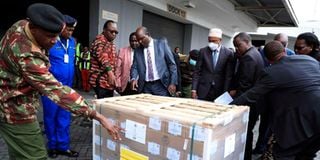Premium
First batch of presidential ballots to arrive this week

IEBC Chairperson Wafula Chebukati when he received the first batch of ballot papers at JKIA on July 7, 2022.
What you need to know:
- Commercial flights are expected to carry up to 100 pallets a day while charter cargo flights will carry 450 pallets for the eight-hour direct flight between Athens and Nairobi.
- The Greek firm that won the Sh3 billion printing contract will embed at least eight security features on the poll papers.
The August 9 election ballot papers will have eight distinct security features embedded in them, as part of costly measures intended to win public trust in the integrity of the polls.
The general political mistrust in the country with only two weeks to the polls has pushed the electoral commission to incorporate multiple security features into the ballot papers and statutory results forms for the presidential election.
At the same time, leading presidential candidates and observer groups are spending millions to send and keep their representatives in Athens, Greece, to monitor and sign off on the printing of ballot papers.
A team of 14 people representing religious groups, leading presidential candidates Raila Odinga and Deputy President William Ruto, the civil society, the Office of the Registrar of Political Parties, Political Parties Liaison Committee (PPLC) and the Media Council of Kenya (MCK) is currently in Greece monitoring and checking the printing of ballot papers for the presidential election.
The Independent Electoral and Boundaries Commission (IEBC) sent two commissioners, vice chairperson Julianna Cherera and Francis Wanderi and some secretariat staff.
The first batch of presidential election ballot papers is tentatively expected to arrive in the country on Wednesday, by which time the monitoring team will have also returned after confirming that all the ballot papers have been printed, palleted and packaged in readiness for delivery to Nairobi.
The second and final batch is tentatively set to arrive on July 30.
Mistrust
According to information provided to the Kenyan delegation, commercial flights are expected to carry up to 100 pallets a day while charter cargo flights will carry 450 pallets for the eight-hour direct flight between Athens and Nairobi.
Information that the Sunday Nation has obtained reveals the real cost of mistrust in the country that over the years has ensured that ballot papers cannot be printed locally.
The Greek firm that won the Sh3 billion printing contract will embed at least eight security features on the poll papers.
They include guilloche pattern, guilloche background, anti-copy feature, invisible ink, embossing, tapered serialisation, micro-printing and watermark duotone.
In the tender document for the printing of ballot papers and statutory results forms, IEBC wanted “a discreet or a special characteristic imparted on each ballot paper giving it unique features that make it tamper-proof.”
The tender document also provided that the background of the presidential election ballot paper to be white, for a member of the National Assembly to be green, for a Member of a County Assembly to be brown, for a senator to be yellow, for a Woman Representative to be purple and for governor to be sky blue.
“The presidential, governor, senator, Member of the National Assembly, Woman rep, Member of County Assembly elections and referendum ballot papers shall have the security features imparted by inks, dyes, electronic or suitable mechanisms. The security features shall be imparted on the printing paper as specified by IEBC,” the commission stated when it was inviting bids last year.
Security features
In the 2017 presidential election petition, one of Nasa’s grounds for challenging the outcome of the poll was that the statutory results used by IEBC could not be relied upon as some had security features while others did not.
It was also alleged that scanning the bar code on some of the forms would direct one to restaurants in France.
The ballot papers and statutory results forms used in the 2017 elections were printed in the United Arab Emirates by Al Ghurair Printing & Publishing.
The team of 14 people currently in Greece were authorised to travel following demands by presidential candidates.
Mr Odinga is represented by lawyer Emma Velma Maumo and his Director of International Engagement and Diaspora Ben Agina. Mr Ruto is represented by Brian Kagombe Mbugua and the UDA Director of Elections Anthony Mwaura Ng’ang’a. Presidential candidates George Wajackoyah and David Waihiga Mwaure did not send representatives.
Representing the religious groups are Fr Joseph Mutie and Abdirahman of the Inter-Religious Council, and Rev Elias Agola of the National Council of Churches of Kenya (NCCK).
Others are Felix Owuor (Electoral Law and Governance Institute for Africa), Anne Wambeti Ireri and Chris Kinyanjui Kamau both of Election Observation Group (ELOG).
Amid campaign trail accusations and counter-accusations between Azimio and Kenya Kwanza of a plot to interfere with the elections, the stakes have been raised even higher among the monitoring team.
The team has been camping at the company's printing premises to monitor and sign off on every stage of the printing and packaging of the ballot papers.
IEBC developed a seven-stage checklist that each member of the delegation has to sign off on for the printing to be completed.
“The monitoring delegation will be required to witness, in writing on the checklist, the completion of several key production points,” an IEBC briefing document seen by the Sunday Nation states.
Besides the checklist of items they have to confirm, there is also information on how the ballot papers will be handled and the efforts in place to secure them.
For instance, every box and pallet of ballot papers will be marked with QR Code to denote the constituency, the polling station, the number of ballots in the booklet and the elective event.
On arrival at JKIA, the pallets will have to be offloaded from the plane on the same day, cleared and the import declaration form issued.
From the airport, the consignment will be moved to IEBC’s Likoni warehouse under tight security.





